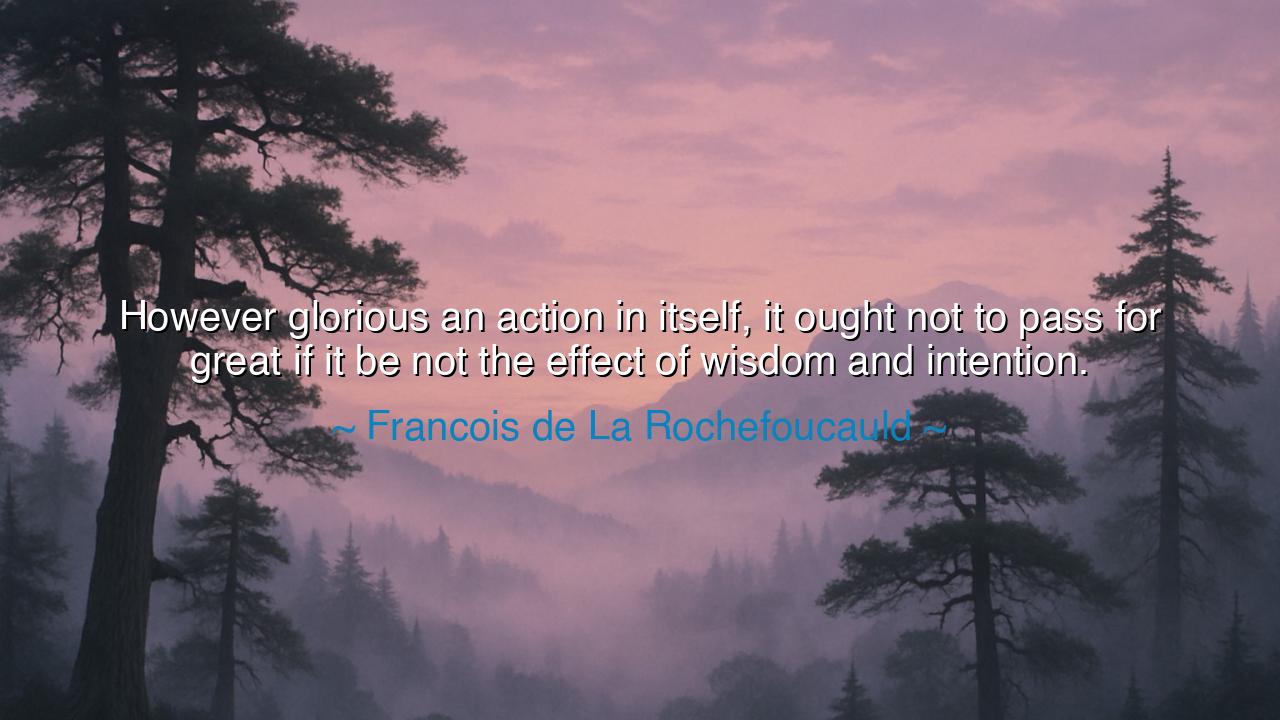
However glorious an action in itself, it ought not to pass for
However glorious an action in itself, it ought not to pass for great if it be not the effect of wisdom and intention.






François de La Rochefoucauld, master of keen observation, warns us with his words: “However glorious an action in itself, it ought not to pass for great if it be not the effect of wisdom and intention.” Here he strips away the glitter of appearances, reminding us that not every deed that dazzles the crowd is truly great. For an act without wisdom, without deliberate intention, is but a spark—bright for a moment, but empty of lasting light.
The meaning runs deep. A soldier may charge into battle recklessly, and the crowd may cheer his courage. Yet if his act springs from rashness rather than purpose, it is not greatness, but chance. A king may bestow riches on his people, but if he does so only to buy their love, it is not virtue, but vanity. La Rochefoucauld teaches us that the measure of an action is not in its glitter, but in its root—whether it flows from thoughtful wisdom and true intention.
History bears witness in the life of Marcus Aurelius, the philosopher-emperor. When plague struck Rome, he did not chase after glory by grand displays of power. Instead, with steady mind, he organized relief, bore his own sorrows in silence, and guided his people with reason and care. His deeds were not rash or self-serving, but born of deliberate intention to serve the common good. Thus his legacy is not of hollow spectacle, but of true greatness rooted in wisdom.
By contrast, consider Napoleon’s invasion of Russia. The march was glorious in its vision—armies stretching for miles, banners shining beneath the sky. Yet it was folly, for it lacked true wisdom. Driven by ambition rather than sound judgment, it led to ruin, consuming thousands of lives and shattering his empire. Here we see La Rochefoucauld’s truth: that brilliance without wisdom and intention may appear mighty, but it collapses into tragedy.
Therefore, let the seeker of virtue remember this: greatness is not in what dazzles the eyes, but in what endures in the soul. Seek not to perform deeds for their outward glory, but let every act flow from wise counsel and pure intention. For only then does action rise beyond chance and vanity to become truly great, a light that shines not for a moment, but across the ages.






NHNga Hang
I like how this perspective connects wisdom with ethical responsibility. It suggests that greatness isn’t just about doing something impressive, but understanding why you’re doing it. That makes me wonder — are modern societies too focused on achievements that look glorious rather than those grounded in thoughtful purpose? Maybe the challenge today is to redefine greatness as intentional integrity, not just visible success.
TNTrac Nham
There’s something very precise and disciplined about this idea. It implies that morality and greatness can’t exist without reason and intention working together. But I can’t help wondering — what about moments of spontaneous goodness, like risking your life to save someone? Are those not great simply because they weren’t calculated? Perhaps the quote values deliberate virtue over emotional impulse.
APAnh Phuong
This quote feels like a moral compass in a world obsessed with results. It suggests that wisdom and purpose elevate an act beyond mere spectacle. But that raises a question — can people always know whether their intentions are pure? Sometimes even wise actions carry unintended consequences. Maybe La Rochefoucauld is reminding us that true virtue lies in conscious awareness, not blind ambition.
Nngoc
I find this statement refreshingly critical. It challenges the idea that good results automatically make an action admirable. It’s interesting — if someone achieves something wonderful by accident or self-interest, should it still be praised? It reminds me of how history often glorifies figures for bold deeds without considering their motives. Does intention matter more than outcome when judging human actions?
VNDo Van Nhan
This quote makes me question how we define greatness. So often, society celebrates outcomes — heroism, success, or innovation — without asking whether they stemmed from thoughtful intention or just luck and impulse. Do you think it’s possible for an unplanned act to still hold moral value? Maybe true greatness isn’t about results but about the wisdom guiding them.